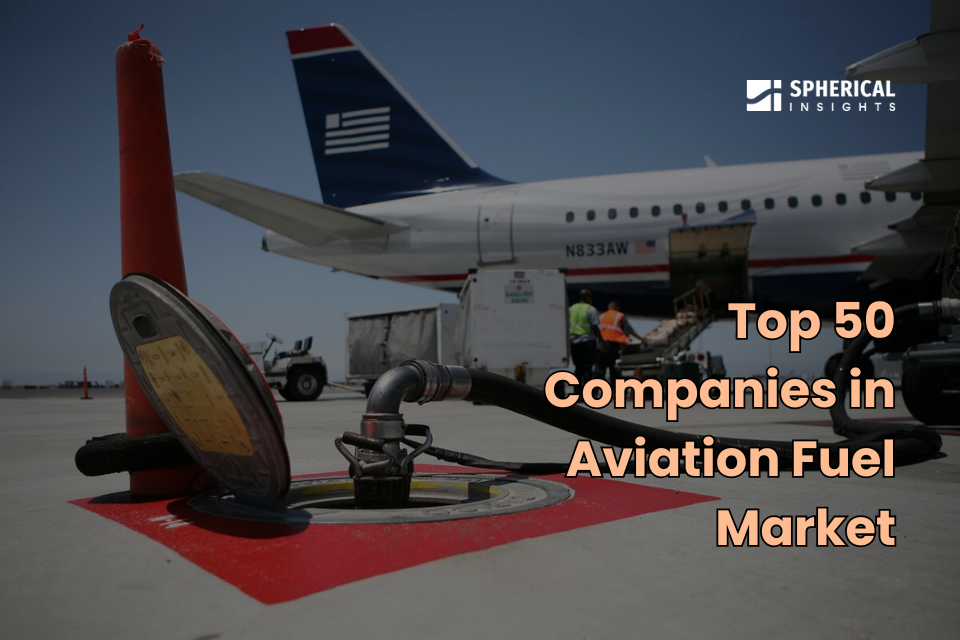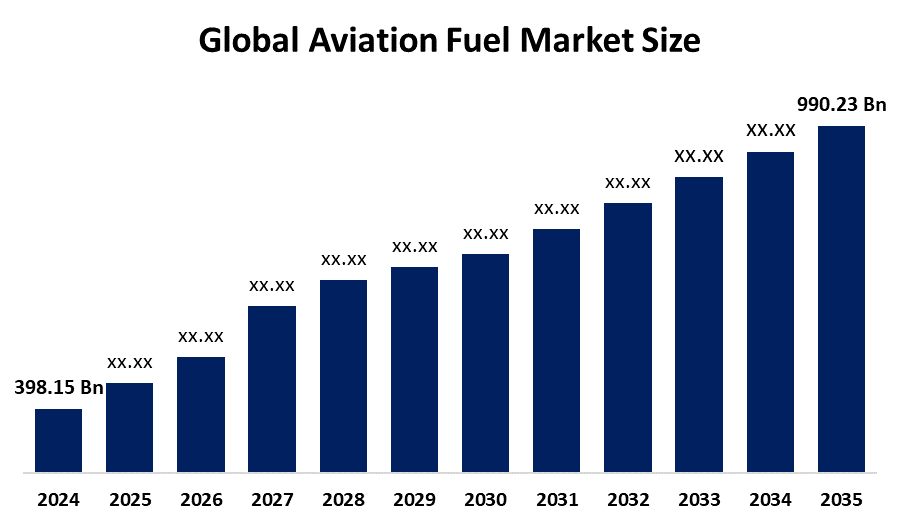
Top 50 Companies in Aviation Fuel Market: Statistics Report Till 2035
RELEASE DATE: Sep 2025 Author: Spherical InsightsRequest Free Sample Speak to Analyst
Description
According to a research report published by Spherical Insights & Consulting, The Global Aviation Fuel Market Size is projected to Grow from USD 398.15 Billion in 2024 to USD 990.23 Billion by 2035, at a CAGR of 8.64% during the forecast period 2025–2035. The demand for aviation fuel is mostly driven by the growth of infrastructure. Existing airports frequently expand to handle larger aircraft, more passengers, and more airline operations as demand for air travel rises. New runways, terminals, taxiways, and other infrastructure will be built as part of this development.
Introduction
All forms of aviation fuel are byproducts of crude oil. Jet fuel's main purpose is to power aircraft; its energy content and combustion quality are important fuel performance characteristics; other critical performance attributes include lubricity, stability, volatility, and non-corrosiveness, among others. Fuel serves as a source of energy as well as a hydraulic fluid in engine control systems and a coolant for certain fuel system components. Bio jet fuel, another name for sustainable fuel, is becoming more and more popular. Depending on the raw components and production technology, it possesses qualities comparable to conventional jet fuel but a lower carbon footprint when used to power aircraft. It can significantly lower greenhouse gas emissions over its lifecycle as compared to traditional jet fuel. Producing bio-jet fuel from waste materials can boost aircraft performance, help the environment, and open up new business opportunities for farmers.
Navigate Future Markets with Confidence: Insights from Spherical Insights LLP
The insights presented in this blog are derived from comprehensive market research conducted by Spherical Insights LLP, a trusted advisory partner to leading global enterprises. Backed by in-depth data analysis, expert forecasting, and industry-specific intelligence, our reports empower decision-makers to identify strategic growth opportunities in fast-evolving sectors. Clients seeking detailed market segmentation, competitive landscapes, regional outlooks, and future investment trends will find immense value in the full report. By leveraging our research, businesses can make informed decisions, gain a competitive edge, and stay ahead in the transition toward sustainable and profitable solutions.
Unlock exclusive market insights-Download the Brochure now and dive deeper into the future of the Aviation Fuel Market.
Aviation fuel Market Size & Statistics
- The Market Size for Aviation Fuel Was Estimated to be worth USD 398.15 Billion in 2024.
- The Market Size is Going to Expand at a CAGR of 8.64% between 2025 and 2035.
- The Global Aviation Fuel Market Size is anticipated to reach USD 990.23 Billion by 2035.
- North America is expected to generate the highest demand during the forecast period in the Aviation Fuel Market.
- Asia-Pacific is expected to grow the fastest during the forecast period in the Aviation Fuel Market.

Regional growth and demand
Asia-Pacific is expected to grow the fastest during the forecast period in the aviation fuel market. Asia Pacific is now comparatively accessible to tourists and foreign visitors, which promotes recovery. Travel demand is growing nicely in spite of the current economic difficulties. Travel restrictions have occasionally been lifted or loosened in some important Asian locations. It is anticipated that the existence of emerging nations in the region will encourage airline travel throughout the projection period because airline travel is linked to economic growth.
North America is expected to generate the highest demand during the forecast period in the aviation fuel market. The market in North America is anticipated to expand over the course of the projected period. The International Air Transport Association reports that in May 2022, North American carriers experienced a 203.4% increase in traffic over 2021. Tourism and a strong desire to travel continued to support the global recovery as the majority of limitations on travel from this region were removed.
Top 5 trends in the Aviation Fuel Market
- Adoption of Sustainable Aviation Fuel (SAF)
- Advancements in Fuel Efficiency Technologies
- Regulatory Pressure and Environmental Policies
- Increasing Volatility in Crude Oil Prices
- Expansion of Direct Air Capture and Synthetic Fuels
1. Adoption of Sustainable Aviation Fuel (SAF)
The push for lower carbon emissions is accelerating the use of SAF, produced from renewable resources like agricultural waste or algae. Airlines are incorporating SAF into their fleets to align with sustainability goals, and its adoption is supported by technological advancements and growing production capacity.
2. Advancements in Fuel Efficiency Technologies
Ongoing innovations in aircraft and engine design are reducing fuel consumption per flight. These improvements not only lower operational costs for airlines but also make manufacturers and operators more competitive in meeting regulatory and consumer demands for greener operations.
3. Regulatory Pressure and Environmental Policies
National and international bodies are implementing stricter policies to limit airline emissions, incentivize greener fuels, and impose carbon costs. This pressures the aviation industry to accelerate its transition to SAF and introduce further innovations in fuel systems to remain compliant.
4. Increasing Volatility in Crude Oil Prices
Aviation fuel markets remain highly sensitive to global oil price changes, impacting airline profitability and strategic purchase planning. Fluctuations prompt airlines to seek diversified energy sources, including alternative and synthetic fuels, to reduce risk and increase supply security.
5. Expansion of Direct Air Capture and Synthetic Fuels
Technologies that synthesize fuel from captured CO2 and green hydrogen are reaching commercial scale, offering a new route to decarbonized jet fuel. Airlines and fuel producers are forming partnerships to accelerate the integration of these synthetic fuels, supporting long-term industry sustainability goals.
Empower your strategic planning:
Stay informed with the latest industry insights and market trends to identify new opportunities and drive growth in the aviation fuel market. To explore more in-depth trends, insights, and forecasts, please refer to our detailed report.
Top 25 Companies Leading the Aviation Fuel Market
- ExxonMobil Corporation
- Shell plc
- BP plc
- TotalEnergies SE
- Phillips 66
- Chevron Corporation
- Valero Energy Corporation
- Marathon Petroleum Corporation
- PetroChina Company Limited
- Indian Oil Corporation
- Sinopec Group
- Neste Corporation
- Royal Dutch Shell Aviation
- Saudi Aramco
- Qatar Petroleum
- Eni S.p.A.
- Repsol S.A.
- ConocoPhillips
- Hess Corporation
- Reliance Industries Limited
- SK Innovation
- PBF Energy
- Murphy Oil Corporation
- Bharat Petroleum Corporation Limited
- Formosa Petrochemical Corporation
1. ExxonMobil Corporation – Headquarters: Irving, Texas, USA
ExxonMobil is a major player in the aviation fuel market, supplying jet fuel globally with a focus on high-quality, efficient fuel products that meet stringent regulatory standards. The company invests heavily in research to develop sustainable aviation fuels (SAFs) derived from bio-based feedstocks and synthetic processes. ExxonMobil’s innovations in fuel formulation aim to reduce carbon emissions and improve engine performance. Its extensive refining and distribution network supports airline operations worldwide, ensuring reliable and scalable fuel delivery. The emphasis on sustainability and technology positions ExxonMobil as a leader in driving the transition toward greener aviation fuels in this competitive market.
2. Shell plc – Headquarters: The Hague, Netherlands
Shell is a leading supplier of aviation fuels, committed to advancing sustainable aviation fuel (SAF) development and distribution. The company collaborates with airlines, airports, and industry stakeholders to scale SAF adoption and reduce aviation’s carbon footprint. Shell integrates advanced refining technologies to produce cleaner fuels and is investing in renewable feedstocks and carbon capture technologies. Its global supply chain ensures the efficient delivery of jet fuels and SAF blends, making it a trusted provider in the aviation sector. Shell’s strategic focus on decarbonization and innovation underpins its strong position in the evolving aviation fuel market.
3. BP plc – Headquarters: London, United Kingdom
BP is a global energy company actively engaged in the aviation fuel sector, offering a comprehensive portfolio of jet fuels with an increasing emphasis on sustainable aviation fuels. BP’s energy transition strategy includes heavy investments in biofuels, hydrogen, and synthetic fuel technologies to reduce aviation emissions. The company operates a vast network of refineries and fuel supply infrastructure worldwide, ensuring consistent availability and quality. Through partnerships with airlines and fuel producers, BP accelerates the deployment of SAF solutions. Its commitment to innovation and sustainability strengthens its leadership role in shaping the future of aviation fuels.
4. TotalEnergies SE – Headquarters: Courbevoie, France
TotalEnergies is a prominent supplier of aviation turbine fuels and a pioneer in sustainable aviation fuel innovation. The company focuses on developing SAF from waste, agricultural residues, and other renewable resources to meet growing industry demand for low-carbon options. TotalEnergies integrates advanced refining processes and collaborates with aerospace companies to optimize fuel performance and environmental impact. Its global logistics and supply chain expertise ensure reliable fuel delivery to airports and airlines. TotalEnergies’ commitment to carbon reduction and collaborative innovation solidifies its market position as a key driver of sustainable aviation fuel adoption.
5. Phillips 66 – Headquarters: Houston, Texas, USA
Phillips 66 provides high-quality aviation fuels and is increasingly focused on sustainable aviation fuel production. The company leverages its refining capabilities and strategic partnerships to scale SAF manufacturing and supply. Phillips 66 emphasizes fuel efficiency and emissions reduction through innovative refining techniques and support for alternative fuels. Its extensive distribution network spans major global airports, enabling dependable fuel availability. With a strong commitment to environmental sustainability, Phillips 66 strives to advance cleaner fuel options that align with evolving regulatory standards and industry climate goals, positioning it as a forward-looking leader in the aviation fuel market.
Are you ready to discover more about the aviation fuel market?
The report provides an in-depth analysis of the leading companies operating in the global aviation fuel market. It includes a comparative assessment based on their product portfolios, business overviews, geographical footprint, strategic initiatives, market segment share, and SWOT analysis. Each company is profiled using a standardized format that includes:
Company Profiles
- ExxonMobil Corporation
- Business Overview
- Company Snapshot
- Products Overview
- Company Market Share Analysis
- Company Coverage Portfolio
- Financial Analysis
- Recent Developments
- Merger and Acquisitions
- SWOT Analysis
- Shell plc
- BP plc
- TotalEnergies SE
- Phillips 66
- Chevron Corporation
- Valero Energy Corporation
- Marathon Petroleum Corporation
- PetroChina Company Limited
- Others.
Conclusion
The Global Aviation Fuel Market Size is experiencing robust growth driven by rising air traffic, increasing demand for commercial and military aviation, and a growing focus on sustainability. Key players are investing heavily in sustainable aviation fuels (SAF) and technologies to reduce carbon emissions and comply with stringent environmental regulations. Innovations in fuel efficiency and supply chain logistics are further enhancing market dynamics. The North American region leads the market due to strong regulatory support and technological advancements, while emerging economies contribute to expanding demand.
About the Spherical Insights & Consulting
Spherical Insights & Consulting is a market research and consulting firm which provides actionable market research study, quantitative forecasting and trends analysis provides forward-looking insight especially designed for decision makers and aids ROI.
Which is catering to different industry such as financial sectors, industrial sectors, government organizations, universities, non-profits and corporations. The company's mission is to work with businesses to achieve business objectives and maintain strategic improvements.
CONTACT US:
For More Information on Your Target Market, Please Contact Us Below:
Phone: +1 303 800 4326 (the U.S.)
Phone: +91 90289 24100 (APAC)
Email: inquiry@sphericalinsights.com, sales@sphericalinsights.com
Contact Us: https://www.sphericalinsights.com/contact-us
Need help to buy this report?